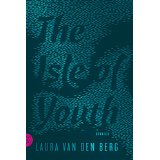 If – like us – you spend a disproportionate amount of your leisure (okay: working) hours dawdling on literary-ish clickbait sites and blogs and news sites, then you’ll have seen the cool kids over in the US getting in a tizzy about Laura van den Berg’s third book, a novel called Find Me, a book that the NYT and the likes have called ‘impressively original’ and ‘radiant’ and ‘unique’. Rewind, then to 2013, and the American release of The Isle of Youth, van den Berg’s second book, and second story collection: it was hailed as the Best Book of the Year by, oh, all the people; Cosmo likened it to Saunders’ Tenth of December; The Rumpus reckoned it was a ‘meaningful contribution’ to contemporary US short story culture; etc., etc.. So, to capitalise on the press attention on the novel, we guess, Daunt Books in the UK have reissued The Isle of Youth, and, intrigued, we’ve given it the once over.
If – like us – you spend a disproportionate amount of your leisure (okay: working) hours dawdling on literary-ish clickbait sites and blogs and news sites, then you’ll have seen the cool kids over in the US getting in a tizzy about Laura van den Berg’s third book, a novel called Find Me, a book that the NYT and the likes have called ‘impressively original’ and ‘radiant’ and ‘unique’. Rewind, then to 2013, and the American release of The Isle of Youth, van den Berg’s second book, and second story collection: it was hailed as the Best Book of the Year by, oh, all the people; Cosmo likened it to Saunders’ Tenth of December; The Rumpus reckoned it was a ‘meaningful contribution’ to contemporary US short story culture; etc., etc.. So, to capitalise on the press attention on the novel, we guess, Daunt Books in the UK have reissued The Isle of Youth, and, intrigued, we’ve given it the once over.
So: there’s seven stories here, all featuring female narrators/protagonists, and all being tales about escape in one form or another – these women want out, whether it’s from a shitty marriage, a demented family, a claustrophobic life, or a guilty conscience. ‘The Isle of Youth’, in the title story, is a deceptive place: not the rejuvenating wonderland we (and the story’s protagonist) might have expected, but in fact a crappy retreat, ‘dirty and run-down’: as a title, then, it represents a pretty good snapshot of the book’s overriding concerns with pipedreams, fantastical desperation, mad hope, and a desperate sort of grim isolation. The stories themselves, however, though thematically integrated, are disparate in the details: there’s a jilted wife trailing a crew of Parisian acrobats; a duo of amateur sister detectives; a disillusioned honeymooner dazed on resentment and painkillers; a pack of fugitive juvenile bankrobbers, including a sister trying to protect her little brother from the other girls’ schemes to ditch him; a truly terrible mother-daughter magic act; a sister who goes all the way to Antarctica to see the scene of her estranged brother’s death; and there’s a woman who shoulders her oddball twin sister’s life and gets (of course) more than she bargained for. So while it’s a really integrated book in terms of theme and motif – siblings, doublings, disappearances, slight of hand, spying – it’s also diverse in terms of how these elements are played out. That is: van den Berg definitely ain’t no kitchen-sink realist; there’s variety and daring in her set-pieces.
Does it work? Well, while, again, we can’t fault the way these pieces are framed – they’re interesting dilemmas; the situations and settings and characters are fascinating and often startling – they never came particularly to life for us, and that seemed to be bound up with the prose style. Given the idiosyncratic nature of the stories’ details, the writing itself lacked what we’re going to call (very technically) a suitable fizz. They could all, we felt, have been told by the same, slightly distant, slightly knowing, sad and confused narrator. The main effect was that, with each story, we could think of somebody else, a writer with, say, a more energetic or atmospheric or just plain notable style or voice, that could, or has, pulled off a similar story to more memorable effect. The worried honeymooner in ‘I Looked For You’? Sarah Hall. ‘The Greatest Escape’ and ‘Lessons’? Kelly Link. ‘Opa-Locka’? Lethem or Kevin Barry. ‘The Isle of Youth’? We’d like to see AM Homes’ cover version of that one. And so on. This feels, and sounds, like a churlish complaint, but the nagging feeling we were left with at the end of The Isle of Youth was that here’s a writer with a kick-ass imagination and a decent way with words, but that her skill hadn’t been pushed hard enough to make each story truly remarkable onto itself.
Any Cop? We feel bad for criticising a book that’s so clearly ambitious and interesting and carefully crafted, but, equally, we feel we’ve been teased here with a glimpse of what might have been, so that what we’ve actually got feels comparatively lacklustre. It’s a good read, but it might have been a great one. We’re intrigued by the novel, though, and we reckon van den Berg will be around a good long while.
Valerie O’Riordan